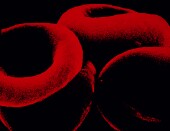 |
 |
 |
||
    |
||||
|
||||

Even Mismatched Cord Blood Can Help Kids
More patients, especially ethnic and racial minorities, could get transplants, study finds|
|
HealthDay
By Robert Preidt
Friday, February 13, 2009
 FRIDAY, Feb. 13 (HealthDay News) -- An umbilical cord blood transplant from an unrelated or unmatched donor can still help children with deadly conditions such as cancer and sickle cell anemia, Duke University Medical Center researchers report.
FRIDAY, Feb. 13 (HealthDay News) -- An umbilical cord blood transplant from an unrelated or unmatched donor can still help children with deadly conditions such as cancer and sickle cell anemia, Duke University Medical Center researchers report.
They noted that unrelated cord blood may be easier to obtain than adult bone marrow, which means more patients would be able to receive treatment.
"Our study found that using cord blood can be effective, without increased complications, and can provide more matches for patients, including ethnic minorities," lead investigator Dr. Vinod Prasad, a pediatric oncologist in the Duke Pediatric Blood and Marrow Transplantation Program, said in a university news release. "Based on the findings of our study, we believe that unrelated cord blood transplant should be considered as an option for many of our young patients in need of a transplant."
Prasad and colleagues analyzed data on 314 patients treated at Duke between 1993 and 2007. The patients, ages 6 months to 21 years, had malignant and non-malignant conditions.
"In order to match a donor to a recipient, doctors compare HLA typing, a test usually performed on a blood sample," Prasad explained. "In every individual, HLA typing includes the specific genetic make-up at three locations -- within those locations, you are looking at one set from the mother and one from the father, so it ends up to be a six-point comparison."
"In this analysis of children whose donor units were matched at four of six points, the transplant was successful in many patients, with low incidence of complications. Results were similar to those seen in patients receiving closer matched transplants. Thus the use of the 4/6 matched donors improved access to transplant for patients, especially those of ethnic and racial minorities," Prasad said.
The study was expected to be presented Friday at an American Society of Bone Marrow Transplantation meeting in Tampa, Fla.
"We have done a terrific job in this country of increasing the number of volunteer donors listed in the National Marrow Donor Program registry over the past several years," Prasad said. "But the fact remains that, for many patients, finding a matched donor can be difficult. Ethnic and racial minorities have the hardest time finding a fully matched donor."
HealthDay
Copyright (c) 2009 ScoutNews, LLC. All rights reserved.
Related News:
More News on this Date
Related MedlinePlus Pages:
| Home | Health Topics | Drugs & Supplements | Encyclopedia | Dictionary | News | Directories | Other Resources | |
| Disclaimers | Copyright | Privacy | Accessibility | Quality Guidelines U.S. National Library of Medicine, 8600 Rockville Pike, Bethesda, MD 20894 National Institutes of Health | Department of Health & Human Services |
Date last updated: 16 February 2009 |
